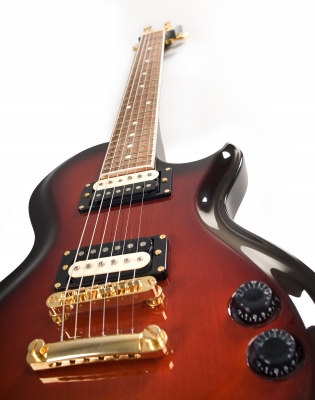How To Write Songs On Guitar More Creatively By Avoiding Common Songwriting Mistakes
Would you like to be able to write songs on guitar more creatively? Do you wish you could get better at writing guitar music that clearly expresses your thoughts and ideas? Do you sometimes get frustrated when you run out of ideas for songwriting? If you answered “yes” to these questions, you are not alone. The truth is, many guitarists struggle to write songs on guitar because they use songwriting approaches that limit their creative potential. By consistently using these same ideas again and again, you become frustrated as you never really get the results you are looking for. This turns into a habit when you do not take the time to think creatively in the songwriting process; forcing you
 to ‘settle’ with mediocre music.
to ‘settle’ with mediocre music.
If you want to start writing guitar music that sounds truly great, you will need to learn how to write songs on guitar by using many different creative approaches. By expanding the songwriting process, it will be much easier for you to consistently think of good ideas each time you pick up the guitar. To help you get started, I have put together the 3 most common guitar songwriting mistakes. Read over each point carefully and learn how to write better guitar songs and become more creative in your songwriting:
1. Not planning out what you want to express BEFORE you begin writing music with your guitar.
Many guitar players do not spend much time thinking about what they truly want to express with their music. Instead, they simply pick up the guitar and begin improvising scales, licks or melodies until finally something “sticks”. When you think about it, if you write guitar music using this as your main approach, you are much less likely to actually come up with good ideas. This is because writing songs in this manner is a totally backwards way of thinking! Think of songwriting like making a movie. If you wanted to write a great film, would you start by hiring a bunch of actors and telling them to simply ‘improvise’ until you had a hit? Of course not. You would carefully analyze exactly what you wanted to say with your film; and from there you would begin developing characters, writing different parts, finding shooting locations, and so forth until your vision was complete. This same idea applies while writing music for guitar. The more you know about what you want to express, the easier it will be to bring your thoughts into reality through music.
To practice this next time you go to write a song on guitar, set your instrument aside and take 15-30 minutes (or more) to think about what you truly want to express. Write down as many ideas, emotions or situations as you can think of on a piece of paper. Once you have done this, pick out several ideas that you would like to use together in a single song. From there, think about how you can bring them out using different musical elements. This could be as simple as using a certain set of chords to convey a specific emotion, or as complex as mapping out different sections in your song with complex and intertwining story lines.
Once you have figured out ‘what’ you want to write about, use the techniques in this free guitar songwriting guide to create guitar riffs that better express your ideas.
2. Exclusively using your guitar to write songs, while neglecting other instruments.
One of the most limiting approaches that you can take while writing music is to ‘only’ use your guitar to come up with songwriting ideas. By writing music in this manner, your songs will become very one dimensional as you continually use ideas that come from your own guitar playing habits. For instance, each time you write a new song it might contain similar rhythms that come from exercises, scales or techniques that you like to play on guitar. Even if you want to write songs on guitar where guitar is a primary instrument, it is likely that your music will still contain additional instruments (drums, vocals, piano etc.). By using different instruments to write songs, you will be able to take advantage of many musical possibilities that are not offered by guitar.
As an exercise, write 3-5 songs on guitar using non-guitar instruments as your primary songwriting tools. For example, begin a song by focusing on creating several interesting rhythms with drums, a smooth bass line with bass guitar, or possibly a series of beautiful arpeggios with piano. Then, include the rest of the instruments into the song (including guitar) and integrate them with these new ideas. Focus on challenging yourself to find new and innovative ways to write with various instruments. This will help you become a more versatile songwriter and develop your musical creativity very quickly!
3. Underestimating the importance of each individual note that you use.
The trademark of a great songwriter is paying close attention to every detail while writing a piece of music. As you write songs on guitar, it is important to really think about the reasons for using each one of the notes you write with. For example, the majority of guitarists frequently do not pay attention to detail when it comes to writing guitar music with chords. Most guitarists think of guitar chords as a single block of notes that you merely place under a melody to make it “sound good”.
In reality, chords are much more interesting and complex than this. The truth is that chords are not just one big block of notes; rather they are made up of several ‘individual’ notes. In order to write songs on guitar that sound great, it is important to treat each of these individual notes as its own melody. The more smoothly you can make the notes from one chord flow into the next, the more pleasing your music will sound. To do this as you are writing guitar music, try the following:
- Take advantage of chords that share notes in common with each other. When you move from one chord to the next, it will make the notes that are not shared stand out.
- Use less ‘familiar’ chord shapes on different positions of the neck to get more options for playing the same chord type. Try to find 3-5 different positions you can use to play the same chord.
- Start by creating a bass line first. Then, slowly add more notes over your bass line until you have created an entire chord (3 or more different notes). Repeat this until you have made a series of chords that contain notes that move by half step or whole step from one note to the next.
Additionally, some other areas of songwriting for guitar that are worthy of your attention could include the following:
- Using different positions on the guitar to get notes with great sounding tone. For example, using the 9 th fret on the “g” string instead of the open “e” string to get a warm sounding tone.
- Using a songwriting style that incorporates both a pick and finger style (playing with your fingers) into your music. A lot of musicians only write guitar music to be played with a pick. By writing guitar songs to be played with both fingers and a pick, you add a new depth to your music in terms of variety of sound. For instance, music played with a pick is generally louder and contains a distinct sound that occurs as the pick strikes the string. On the other hand, music played with the fingers sounds much more soft and delicate.
Remember, it takes time to become highly creative and write great guitar songs. You have now learned how to avoid some of the biggest songwriting mistakes that most guitarists make. By simply doing this, you have taken a big step to speed up your progress as a songwriter. The most important thing for you to do now is to take action to utilize this knowledge to write better guitar songs.
Do you like what you hav read so far? Let's go together more in depth onwhat specific techniques a songwriter can use to make better guitar songs in this free guide on how to write guitar riffs (click on the button below to get it!):
Become a better songwriter fast by getting new ideas for writing songs .
